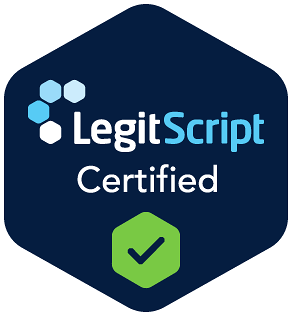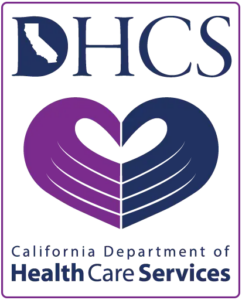Breaking free from addiction requires professional medical support, especially during the withdrawal phase. Detox programs in Huntington Beach offer the supervised care needed for safe recovery.
We at Surf City Detox understand that choosing the right detox program can feel overwhelming. This guide will help you navigate your options and take that first step toward lasting sobriety.
What Happens During Detox in Huntington Beach
Medical detox in Huntington Beach operates under strict safety protocols that separate dangerous self-detox from professional recovery. Licensed facilities provide 24/7 medical monitoring by trained professionals who track vital signs, manage withdrawal symptoms, and intervene immediately when complications arise. This supervision saves lives during alcohol and benzodiazepine withdrawal, which can cause seizures and delirium tremens without proper medical management.
Medical Supervision Standards
Accredited detox centers follow California Department of Health Care Services regulations that require registered nurses on-site around the clock and physician oversight for medication management. Staff monitor blood pressure, heart rate, and neurological symptoms every few hours during the acute withdrawal phase. Medications like benzodiazepines for alcohol withdrawal or buprenorphine for opioid dependence are administered based on standardized protocols that reduce risk and increase comfort. The Joint Commission accreditation adds another layer of safety verification that separates legitimate facilities from substandard options.
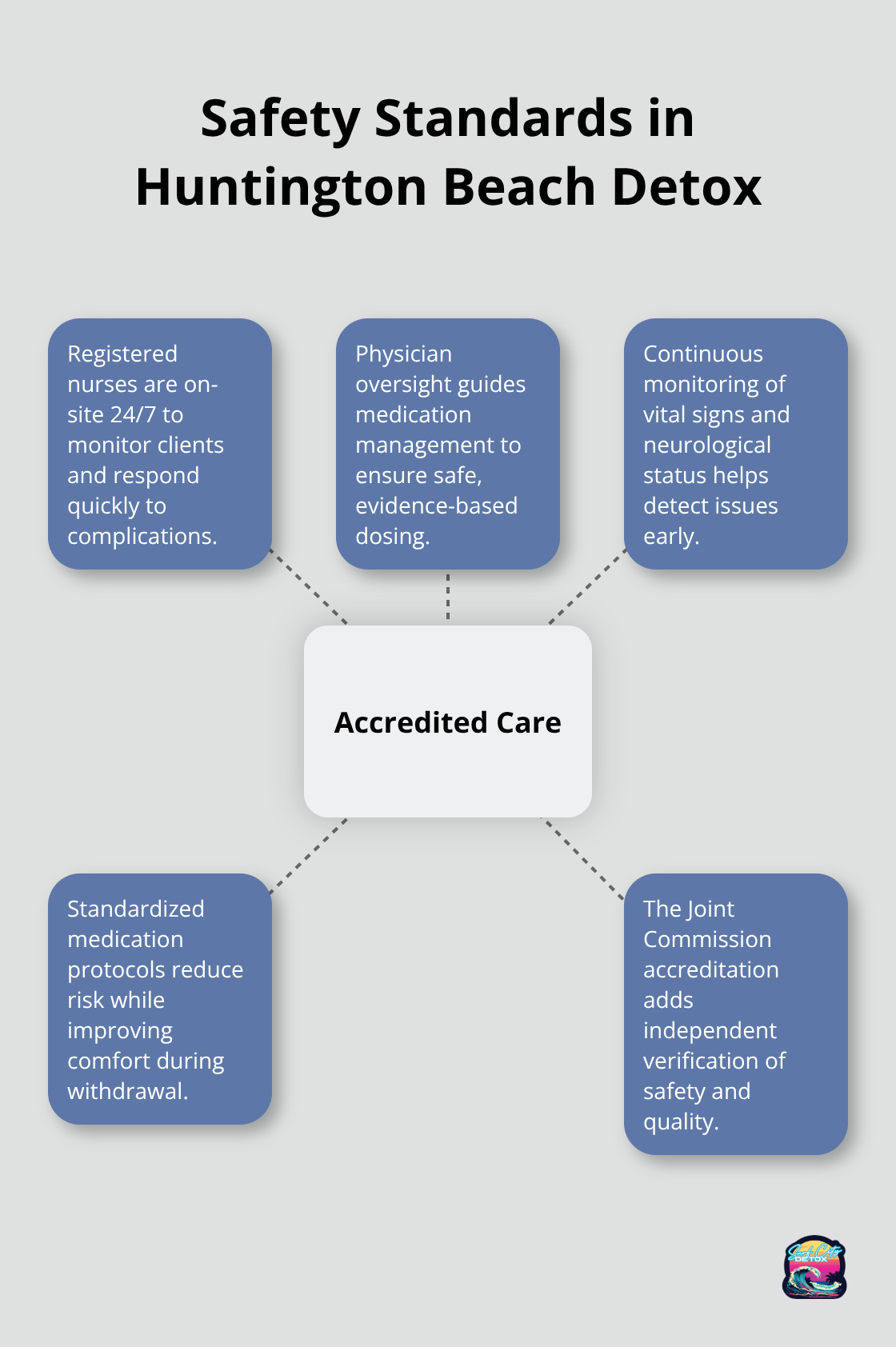
Substances and Treatment Duration
Huntington Beach detox programs treat alcohol, opioids (including fentanyl), methamphetamine, benzodiazepines, and cocaine dependencies with specialized protocols for each substance. Alcohol detox typically spans 5 to 7 days with symptoms that peak around day 3, while opioid withdrawal follows a similar timeline but may require medication-assisted treatment that extends beyond initial detox. Methamphetamine withdrawal creates intense psychological symptoms that last 7 to 14 days and requires psychiatric support alongside medical care. Fentanyl cases have increased dramatically, making professional medical oversight absolutely necessary rather than optional.
Physical and Emotional Support Systems
Professional detox programs address both physical withdrawal symptoms and the emotional challenges that accompany early recovery. Medical teams use evidence-based protocols to minimize discomfort while counselors provide emotional support during this vulnerable time. Clients receive nutritional support to help their bodies heal from substance abuse damage, and many facilities offer holistic therapies like yoga and meditation to reduce anxiety and promote mental clarity. This comprehensive approach prepares clients for the next phase of treatment, where they can address the underlying causes of their addiction through therapy and skill development.
What Makes Huntington Beach Detox Programs Effective
The coastal environment of Huntington Beach provides measurable mental health benefits that accelerate addiction recovery beyond what inland facilities can offer. Ocean proximity reduces cortisol levels according to research, while the sound of waves activates the parasympathetic nervous system that counteracts withdrawal-related anxiety. Natural sunlight exposure increases serotonin production and regulates circadian rhythms that substance abuse disrupts, which creates biological conditions that support recovery. The negative ions that ocean waves generate improve oxygen absorption and mental clarity, which gives clients a natural advantage during the challenging early weeks of recovery.
Medical and Therapeutic Integration That Works
Effective Huntington Beach programs combine medical detox with immediate therapeutic intervention rather than treat them as separate phases. Quality facilities integrate dual diagnosis treatment from day one and address anxiety, depression, and trauma alongside physical withdrawal symptoms through evidence-based approaches like Cognitive-Behavioral Therapy and Dialectical Behavior Therapy. This simultaneous approach prevents relapse that occurs when mental health issues remain untreated during detox. Licensed facilities use medication-assisted treatment for opioid addiction while they provide counseling that addresses the emotional pain that drives substance use.
Treatment Plans Built on Real Assessment Data
Personalized treatment plans in Huntington Beach start with comprehensive medical and psychological assessments that determine substance-specific protocols, co-occurring mental health needs, and individual risk factors. Programs analyze withdrawal patterns, family history, trauma experiences, and previous treatment attempts to create targeted interventions rather than generic approaches. Effective facilities adjust medication dosages based on real-time symptom monitoring and modify therapy approaches when clients show specific triggers or coping skill gaps. This data-driven personalization reduces treatment duration compared to standardized programs while it improves long-term sobriety rates through targeted skill development.
Accreditation Standards That Matter
The Joint Commission accreditation and California Department of Health Care Services licensing separate legitimate facilities from substandard options in the Huntington Beach area. These standards require registered nurses on-site around the clock, physician oversight for medication management, and evidence-based treatment protocols that protect client safety. Accredited facilities must demonstrate measurable outcomes, maintain proper staff-to-client ratios (typically 1:4 during detox), and follow strict medication management protocols. These requirements create accountability that directly impacts treatment quality and client safety during the vulnerable withdrawal period.
When you evaluate different detox options, these quality indicators will help you identify programs that offer genuine therapeutic value rather than basic medical monitoring.
How Do You Pick the Right Detox Program
The Joint Commission accreditation and California Department of Health Care Services licensing separate legitimate detox programs from facilities that compromise safety standards. The Joint Commission requires registered nurses on-site 24/7, physician oversight for medication protocols, and documented outcomes that prove treatment effectiveness. California licensing mandates staff-to-client ratios of 1:4 during detox, proper medication storage, and emergency response capabilities.
Programs without these credentials cannot legally provide medical detox services and create serious risks during withdrawal complications. Newsweek recognizes facilities like HB Treatment Center and Laguna Treatment Center as top addiction treatment centers, but accreditation status matters more than media rankings when your safety depends on proper medical protocols.
Insurance Coverage Determines Real Treatment Options
Most major insurance providers (including Aetna, Blue Cross Blue Shield, and United Healthcare) cover medically necessary detox treatment, but coverage varies significantly between plans and facilities. PPO plans typically offer more flexibility in detox program selection, while HMO plans require referrals and limit options to network providers.
Medicare and Medicaid cover addiction treatment under the Mental Health Parity Act, which prevents group health plans and health insurance issuers from providing less favorable benefits for mental health or substance use disorder treatment. Out-of-network costs can reach $1,000 to $2,000 per day for private detox programs, which makes insurance verification critical before admission. Contact your insurance directly rather than rely on facility estimates, because pre-authorization requirements and benefit limits change frequently.
Essential Questions That Reveal Program Quality
Ask detox programs about their medical director credentials, nurse-to-patient ratios during night shifts, and protocols for managing seizures and cardiac events during withdrawal. Request specific information about medication-assisted treatment options for opioid addiction, psychiatric support for dual diagnosis clients, and family communication policies during treatment.
Programs that hesitate to discuss their emergency procedures, discharge planning process, or success rate measurements should raise immediate red flags. Quality facilities provide detailed answers about their treatment philosophy, therapy approaches, and transition planning to residential or outpatient programs.
Red Flags That Signal Poor Quality Care
Facilities that promise quick fixes or guarantee specific outcomes typically lack evidence-based treatment approaches. Programs that refuse insurance verification calls, demand full payment upfront, or pressure immediate admission often prioritize profits over patient care. Staff turnover rates above 30% annually indicate management problems that affect treatment consistency.
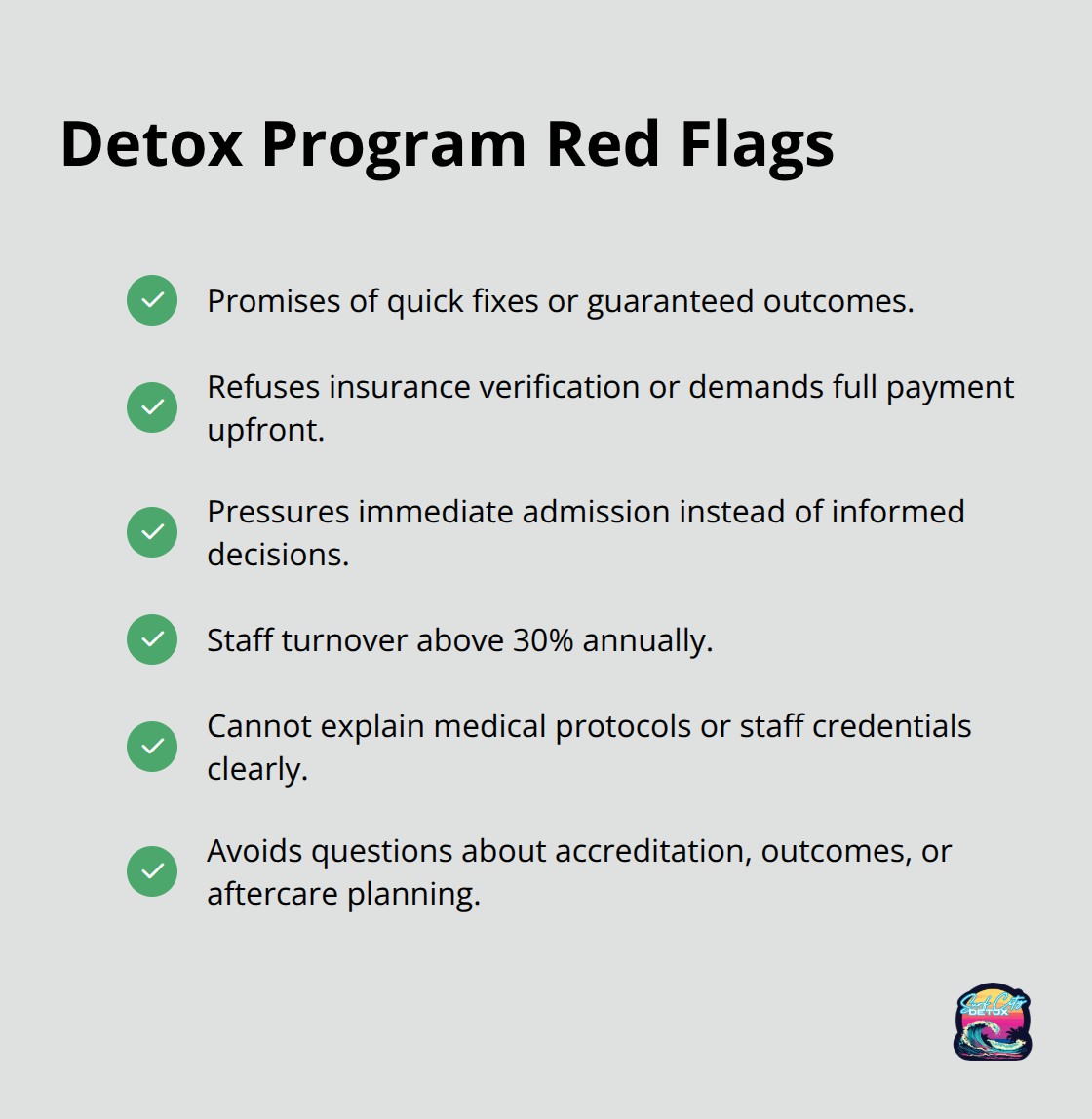
Avoid programs that cannot provide specific information about their medical protocols, emergency procedures, or staff qualifications. Legitimate facilities welcome questions about their accreditation status, treatment outcomes, and aftercare planning processes.
Final Thoughts
Professional medical detox separates dangerous self-withdrawal from safe recovery. Fentanyl caused 83% of opioid deaths from 2019 to 2021, while 17% of California adults engage in monthly binge drinking. These statistics demonstrate why medically supervised withdrawal management saves lives during the most vulnerable phase of recovery.
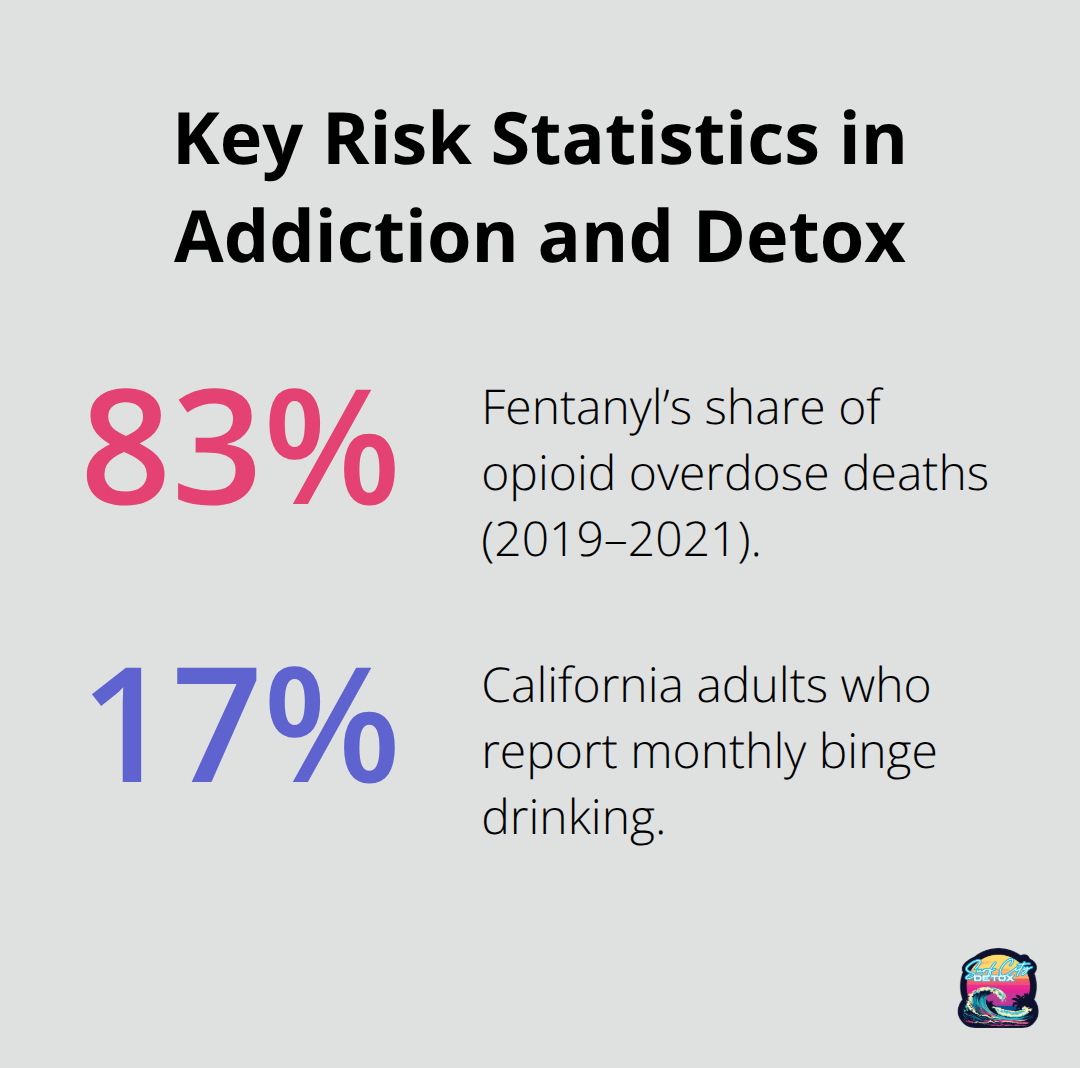
Quality detox programs Huntington Beach provide 24/7 medical monitoring, evidence-based treatment protocols, and compassionate care that addresses both physical symptoms and emotional challenges. The coastal environment offers additional healing benefits through reduced cortisol levels and improved mental clarity. Taking the first step toward sobriety requires courage, but you don’t have to face withdrawal alone.
We at Surf City Detox combine medically supervised detox with dual diagnosis care for co-occurring mental health conditions in a small, personalized setting (accredited by The Joint Commission and licensed by the California Department of Health Care Services). Recovery becomes possible when you have the right support system. Contact Surf City Detox today to speak with our compassionate intake specialists who will verify your insurance and guide you through the admission process.

